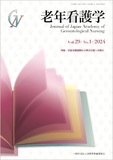Japanese
English
- 販売していません
- Abstract 文献概要
- 参考文献 Reference
抄録
本研究の目的は,認知症初期集中支援チームのメンバーである看護職の看護活動を明らかにすることである.8人の看護職へ半構造化インタビューを行い,質的記述的に分析し,7コアカテゴリを得た.看護職は,初期集中支援として【初回訪問時の関係づくり】【円滑な医療導入のための高齢者・家族と医療機関との調整】で確実な医療導入を図り,【診断後の継続支援マネジメント】で医療継続と当事者・家族の生活支援のマネジメントをしていた.また,【認知症介護のための家族支援】により介護家族の支援を行い,【意思決定する高齢者・介護家族のアドボケイト】により高齢者や家族の尊厳を守っていた.同時に,認知症初期集中チームのメンバーとして【チーム活動のための調整と運営】を行い,チームによる初期集中支援に寄与していた.また,【個別初期集中支援のための地域環境づくり】を行うことで地域の認知症高齢者ケアに努めていた.
This study aims to elucidate the nursing activities of nurses in teams providing the Initial-Phase Intensive Support Team for dementia (IPIST). Semi-structured interviews were conducted with eight nurses,and qualitative descriptive analysis of these interviews yielded seven core categories. In the IPIST,nurses facilitated a smooth transition into medical care by “establishing rapport during initial visits” and “coordinating among the patients,their family members,and health care providers”. They effectively managed medical continuity and life support for the patients and their families through “post-diagnosis continuing support management”.
They also supported family caregivers through “family support for dementia care.” Additionally,they upheld the dignity of both patients and their family members by “advocating for patient and family decision making.” At the same time,as members of IPIST,they “coordinated and conducted team activities,” and contributed significantly to the team's efforts. In addition,they worked to improve local dementia care by “fostering a community environment that supports individualized early intensive support”.
Copyright © 2024, Japan Academy of Gerontological Nursing All rights reserved.


